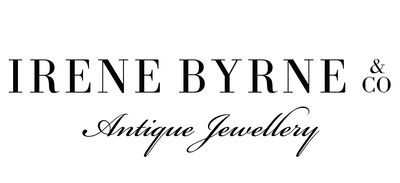Edwardian Australian 3.80ct Colombian Emerald Ring
Irene Byrne & Co






Just in, we have this spectacular Colombian Emerald ring from the 1900s. This is one of those rare pieces we hardly get to see. Its rarity is due to the fact that it is Australian made, by jeweller Joseph Lawrence of Melbourne and features a very large 3.80ct Colombian Emerald. Finding a specimen of this size, colour and clarity in the 1900s was a huge feat and we can only imagine that the person the ring belonged to and was made for, was the owner of such a rare gemstone from one of the most notable mines in Colombia. The emerald is set in a very simplistic 15ct yellow gold setting (true to Australian antique jewellery) with a ‘rope’ border, allowing the sheer calibre of the stone to shine.
Circa: 1910
Design Period: Edwardian
Gemstone: Colombian Emerald
Cut: Oval
Carat: 3.80ct
Colour: Medium Green
Clarity: Medium Inclusions
Material: 15ct Yellow Gold
Maker: Jospeh Lawrence of Melbourne
Colour: Medium Green
Clarity: Medium Inclusions
Material: 15ct Yellow Gold
Maker: Jospeh Lawrence of Melbourne
Edwardian & Belle Époque Period (1901 - 1910):
Named after the reigning King Edward VII and with notable influences from French Rococo décor, this period was the shortest in antique jewellery history. However, it was during this time that platinum was introduced into the art of jewellery making which changed the way diamonds could be set. The popular jewellery design at the time was the “garland” which flowed on from the Art Nouveau period as it focused on nature but more particularly, on flowers and leaves often arranged in some circular shape. Through the use of milgrain and pierced and engraved metals, the Belle Époque designs gave way to jewellery that mimicked the delicate nature of lace and ribbon with natural pearls and old mine cut diamonds being the material of choice.
Named after the reigning King Edward VII and with notable influences from French Rococo décor, this period was the shortest in antique jewellery history. However, it was during this time that platinum was introduced into the art of jewellery making which changed the way diamonds could be set. The popular jewellery design at the time was the “garland” which flowed on from the Art Nouveau period as it focused on nature but more particularly, on flowers and leaves often arranged in some circular shape. Through the use of milgrain and pierced and engraved metals, the Belle Époque designs gave way to jewellery that mimicked the delicate nature of lace and ribbon with natural pearls and old mine cut diamonds being the material of choice.
